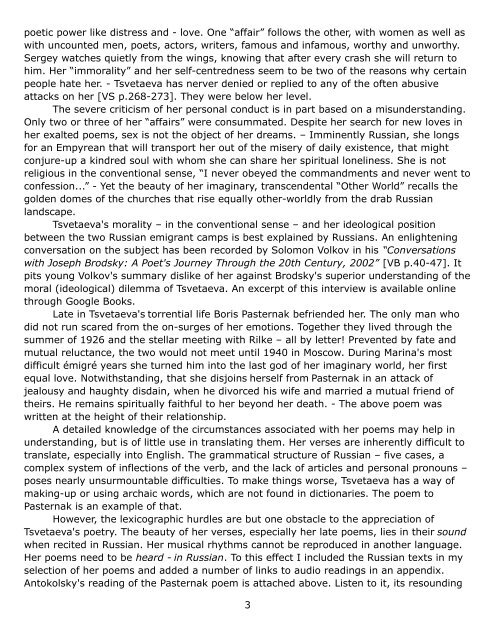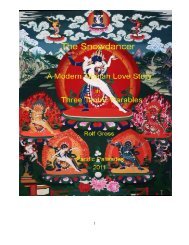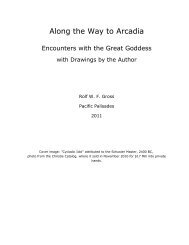Marina Tsvetaeva, Her Life in Poems - Rolf Gross
Marina Tsvetaeva, Her Life in Poems - Rolf Gross
Marina Tsvetaeva, Her Life in Poems - Rolf Gross
Create successful ePaper yourself
Turn your PDF publications into a flip-book with our unique Google optimized e-Paper software.
poetic power like distress and - love. One “affair” follows the other, with women as well as<br />
with uncounted men, poets, actors, writers, famous and <strong>in</strong>famous, worthy and unworthy.<br />
Sergey watches quietly from the w<strong>in</strong>gs, know<strong>in</strong>g that after every crash she will return to<br />
him. <strong>Her</strong> “immorality” and her self-centredness seem to be two of the reasons why certa<strong>in</strong><br />
people hate her. - <strong>Tsvetaeva</strong> has nerver denied or replied to any of the often abusive<br />
attacks on her [VS p.268-273]. They were below her level.<br />
The severe criticism of her personal conduct is <strong>in</strong> part based on a misunderstand<strong>in</strong>g.<br />
Only two or three of her “affairs” were consummated. Despite her search for new loves <strong>in</strong><br />
her exalted poems, sex is not the object of her dreams. – Imm<strong>in</strong>ently Russian, she longs<br />
for an Empyrean that will transport her out of the misery of daily existence, that might<br />
conjure-up a k<strong>in</strong>dred soul with whom she can share her spiritual lonel<strong>in</strong>ess. She is not<br />
religious <strong>in</strong> the conventional sense, “I never obeyed the commandments and never went to<br />
confession...” - Yet the beauty of her imag<strong>in</strong>ary, transcendental “Other World” recalls the<br />
golden domes of the churches that rise equally other-worldly from the drab Russian<br />
landscape.<br />
<strong>Tsvetaeva</strong>'s morality – <strong>in</strong> the conventional sense – and her ideological position<br />
between the two Russian emigrant camps is best expla<strong>in</strong>ed by Russians. An enlighten<strong>in</strong>g<br />
conversation on the subject has been recorded by Solomon Volkov <strong>in</strong> his “Conversations<br />
with Joseph Brodsky: A Poet's Journey Through the 20th Century, 2002” [VB p.40-47]. It<br />
pits young Volkov's summary dislike of her aga<strong>in</strong>st Brodsky's superior understand<strong>in</strong>g of the<br />
moral (ideological) dilemma of <strong>Tsvetaeva</strong>. An excerpt of this <strong>in</strong>terview is available onl<strong>in</strong>e<br />
through Google Books.<br />
Late <strong>in</strong> <strong>Tsvetaeva</strong>'s torrential life Boris Pasternak befriended her. The only man who<br />
did not run scared from the on-surges of her emotions. Together they lived through the<br />
summer of 1926 and the stellar meet<strong>in</strong>g with Rilke – all by letter! Prevented by fate and<br />
mutual reluctance, the two would not meet until 1940 <strong>in</strong> Moscow. Dur<strong>in</strong>g <strong>Mar<strong>in</strong>a</strong>'s most<br />
difficult émigré years she turned him <strong>in</strong>to the last god of her imag<strong>in</strong>ary world, her first<br />
equal love. Notwithstand<strong>in</strong>g, that she disjo<strong>in</strong>s herself from Pasternak <strong>in</strong> an attack of<br />
jealousy and haughty disda<strong>in</strong>, when he divorced his wife and married a mutual friend of<br />
theirs. He rema<strong>in</strong>s spiritually faithful to her beyond her death. - The above poem was<br />
written at the height of their relationship.<br />
A detailed knowledge of the circumstances associated with her poems may help <strong>in</strong><br />
understand<strong>in</strong>g, but is of little use <strong>in</strong> translat<strong>in</strong>g them. <strong>Her</strong> verses are <strong>in</strong>herently difficult to<br />
translate, especially <strong>in</strong>to English. The grammatical structure of Russian – five cases, a<br />
complex system of <strong>in</strong>flections of the verb, and the lack of articles and personal pronouns –<br />
poses nearly unsurmountable difficulties. To make th<strong>in</strong>gs worse, <strong>Tsvetaeva</strong> has a way of<br />
mak<strong>in</strong>g-up or us<strong>in</strong>g archaic words, which are not found <strong>in</strong> dictionaries. The poem to<br />
Pasternak is an example of that.<br />
However, the lexicographic hurdles are but one obstacle to the appreciation of<br />
<strong>Tsvetaeva</strong>'s poetry. The beauty of her verses, especially her late poems, lies <strong>in</strong> their sound<br />
when recited <strong>in</strong> Russian. <strong>Her</strong> musical rhythms cannot be reproduced <strong>in</strong> another language.<br />
<strong>Her</strong> poems need to be heard - <strong>in</strong> Russian. To this effect I <strong>in</strong>cluded the Russian texts <strong>in</strong> my<br />
selection of her poems and added a number of l<strong>in</strong>ks to audio read<strong>in</strong>gs <strong>in</strong> an appendix.<br />
Antokolsky's read<strong>in</strong>g of the Pasternak poem is attached above. Listen to it, its resound<strong>in</strong>g<br />
3
















